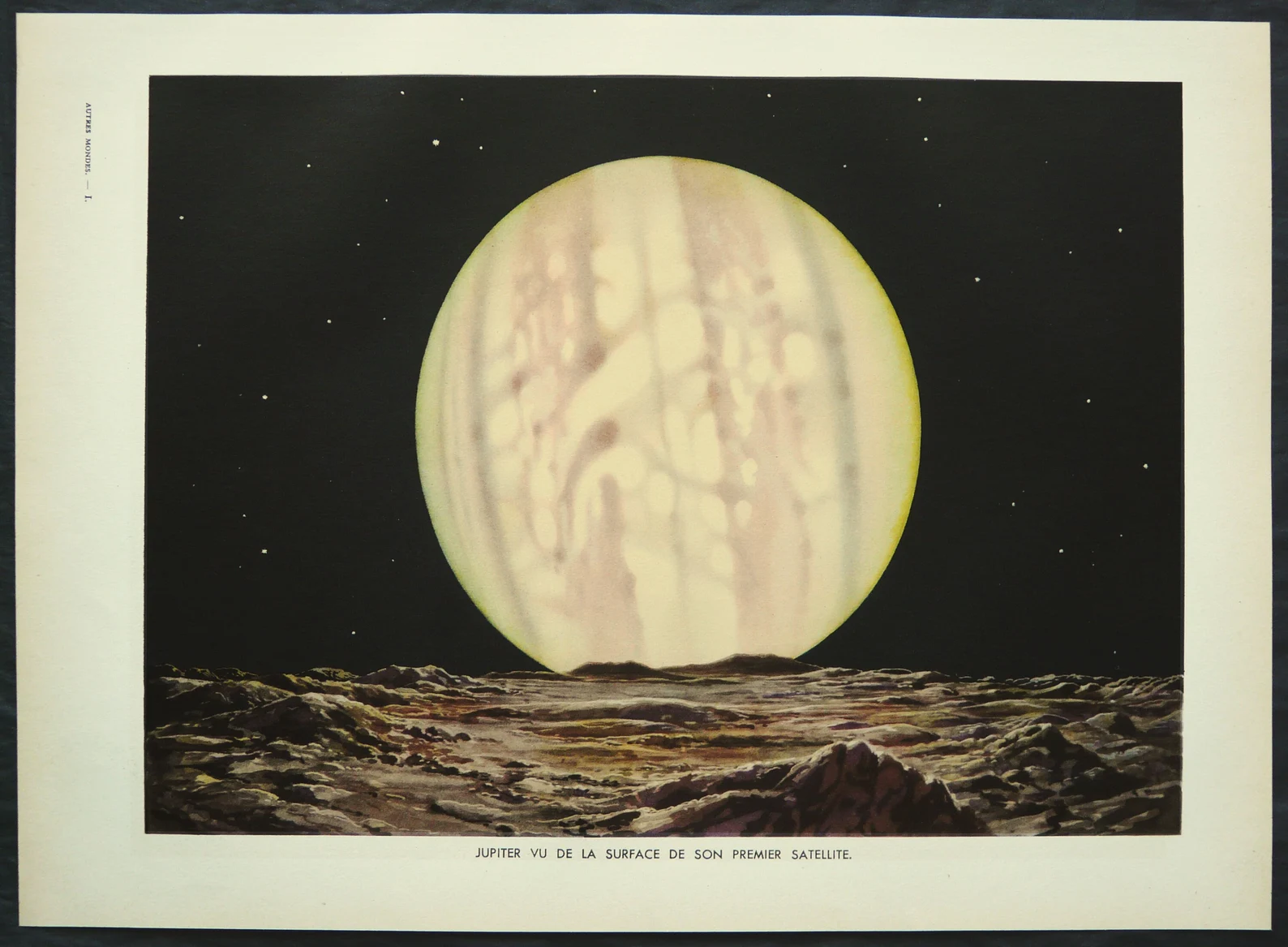WATCHERS OF THE SKY
By:
July 19, 2023
A series dedicated to poems, published c. 1900–1935, the Radium Age sf-adjacent themes of which include: dystopia and utopia, far-out mathematics and the fourth dimension, Afro-futurism, catastrophe, future war, new technologies, scientific breakthrough, dehumanization, cosmic awe, disenchantment and unseen forces, unknowable aliens and singularity. Research and selection by Joshua Glenn; thematic index here.

Then, at a word, the mighty weapon dipped
Its muzzle and aimed at one small point of
light
One seeming insignificant star.
The chief,
Mounting the ladder, while we held our
breath,
Looked through the eye-piece.
Then we heard him laugh
His thanks to God, and hide it in a jest.
“A prominence on Jupiter!” —
They laughed,
“What do you mean?” — “It’s moving,” cried
the chief,
They laughed again, and watched his
glimmering face
High overhead against that moving tower.
“Come up and see, then!”
One by one they went,
And, though each laughed as he returned
to earth,
Their souls were in their eyes.
Then I, too, looked,
And saw that insignificant spark of light
Touched with new meaning, beautifully
reborn,
A swimming world, a perfect rounded
pearl,
Poised in the violet sky; and, as I gazed,
I saw a miracle, — right on its upmost edge
A tiny mound of white that slowly rose,
Then, like an exquisite seed-pearl, swung
quite clear
And swam in heaven above its parent
world
To greet its three bright sister-moons.
A moon,
Of Jupiter, no more, but clearer far
Than mortal eyes had seen before from
earth,
O, beautiful and clear beyond all dreams
Was that one silver phrase of the starry
tune
Which Galileo’s “old discoverer” first
Dimly revealed, dissolving into clouds
The imagined fabric of our universe.
“Jupiter stands in heaven and will stand
Though all the sycophants bark at him,” he
cried,
Hailing the truth before he, too, went
down,
Whelmed in the cloudy wreckage of that
dream.
— Noyes’ ambitious epic verse trilogy The Torch-Bearers, comprising Watchers of the Sky (1922), The Book of Earth (1925), and The Last Voyage (1930), deals with the history of science. From the “Prefatory Note” to Watchers of the Sky:
This volume, while it is complete in itself, is also the first of a trilogy, the scope of which is suggested in the prologue. The story of scientific discovery has its own epic unity – a unity of purpose and endeavour – the single torch passing from hand to hand through the centuries; and the great moments of science when, after long labour, the pioneers saw their accumulated facts falling into a significant order – sometimes in the form of a law that revolutionised the whole world of thought – have an intense human interest, and belong essentially to the creative imagination of poetry. It is with these moments that my poem is chiefly concerned, not with any impossible attempt to cover the whole field or to make a new poetic system, after the Lucretian model, out of modern science.
The first volume, dealing with “watchers of the sky,” began to take definite shape only on the night of 1/2 November 1917, when the 100-inch reflecting telescope at Mount Wilson Observatory was first tested by starlight. George Ellery Hale, the man who conceived and founded the observatory, had invited Noyes, who was then in California, to be his guest on this momentous occasion.
Note that Michael Roberts’s 1928 Poetry Review essay “On Mechanical Hallelujahs, Or How Not to Do It” criticizes Noyes’ poems for being overawed by the scale of the universe.
Also see the essay “A Mountain Observatory,” in Noyes’s New Essays and American Impressions (1927), which details the occasion of the first trial of the astronomer Hale’s new hundred-inch telescope on Mount Wilson in Pasadena, California. “Hale looked through the eye-piece first, and chuckled — “A prominence on Jupiter!” The astronomers laughed. “It’s growing,” he called again. “Come up and see.” One by one we went in turn, and saw what he meant, — one of the most beautiful things I have ever seen, or ever hope to see, a moonrise on Jupiter.”
RADIUM AGE PROTO-SF POETRY: Stephen Spender’s THE PYLONS | George Sterling’s THE TESTIMONY OF THE SUNS | Archibald MacLeish’s EINSTEIN | Thomas Thornely’s THE ATOM | C.S. Lewis’s DYMER | Stephen Vincent Benét’s METROPOLITAN NIGHTMARE | Robert Frost’s FIRE AND ICE | Aldous Huxley’s FIFTH PHILOSOPHER’S SONG | Sara Teasdale’s “THERE WILL COME SOFT RAINS” | Edith Södergran’s ON FOOT I HAD TO… | Robert Graves’s WELSH INCIDENT | Nancy Cunard’s ZEPPELINS | D.H. Lawrence’s WELLSIAN FUTURES | & many more.
